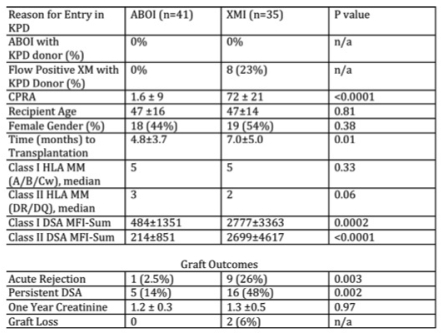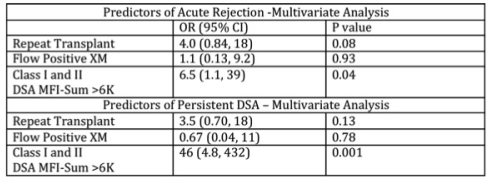Outcomes of Kidney Transplantation of ABO- and Crossmatch-Incompatible Recipient-Donor Pairs Entered in Kidney Paired Donation Program
D. Dadhania, M. Charlton, M. Aull, R. Friedlander, T. Muthukumar, J. Lee, M. Goris, D. Serur, S. Kapur, V. Sharma.
Transplantation Medicine, Weill Cornell Medical Center, New York, NY.
Meeting: 2015 American Transplant Congress
Abstract number: 370
Keywords: Antibodies, Donors, Kidney, Rejection, unrelated
Session Information
Session Name: Concurrent Session: Kidney: Antibodies and Allograft Injury
Session Type: Concurrent Session
Date: Tuesday, May 5, 2015
Session Time: 2:15pm-3:45pm
 Presentation Time: 2:15pm-2:27pm
Presentation Time: 2:15pm-2:27pm
Location: Room 118-AB
Kidney Paired Donation (KPD) enables ABO-incompatible (ABOI) and crossmatch-incompatible (XMI) patients to undergo transplantation using a 'more compatible' donor. Identification of factors that predict early graft complications in transplant recipients following kidney transplantation from 'more compatible' donors would inform selection of donors for future KPD transplants. Herein, we describe our experience of ABOI and XMI patient-donor pairs enrolled in the KPD program.
Methods:
From Feb 2008 to March 2013, we have entered 41 ABOI patient-donor pairs and 35 XMI patient-donor pairs into KPD and transplanted them with ' more compatible' donors. Baseline demographics, histocompatibility data and graft outcomes of these 'compatible grafts' were compared between the two groups. We further studied the predictors of graft rejection and persistent DSA post-transplantation.
Results:
Characteristics of ABOI and XMI recipients entered in the KPD program are summarized in Table 1.

The class I and class II combined DSA MFI-Sums against the ' more compatible' KPD donors were significantly lower compared to the original paired donors of the XMI patients (5,476 ± 5,367 vs. 26,954 ± 14,645; P<0.001).

Conclusion:
Sensitized recipients enrolled in KPD programs are at increased risk for graft complications. DSA MFI-Sum >6K are independently associated with increased risk of acute rejection and persistence of DSA post-transplantation and may represent a useful tool to evaluate potential KPD donors for sensitized patients.
To cite this abstract in AMA style:
Dadhania D, Charlton M, Aull M, Friedlander R, Muthukumar T, Lee J, Goris M, Serur D, Kapur S, Sharma V. Outcomes of Kidney Transplantation of ABO- and Crossmatch-Incompatible Recipient-Donor Pairs Entered in Kidney Paired Donation Program [abstract]. Am J Transplant. 2015; 15 (suppl 3). https://atcmeetingabstracts.com/abstract/outcomes-of-kidney-transplantation-of-abo-and-crossmatch-incompatible-recipient-donor-pairs-entered-in-kidney-paired-donation-program/. Accessed June 30, 2025.« Back to 2015 American Transplant Congress
